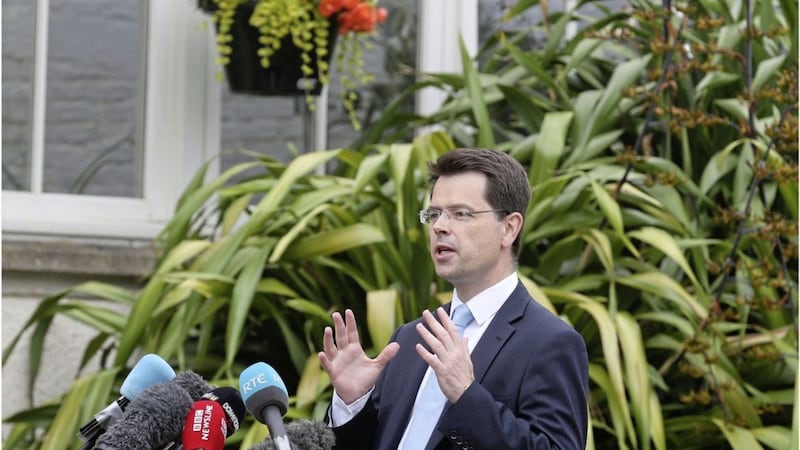WELL, after six months of relentless jibber-jabber - and I'm writing this seven hours before the latest deadline expires - I've still no idea if anything will be agreed.
By the time you read this there may well be a drift of winged pigs flying across the sky, squealing their delight at the news that a deal has been struck between Arlene and Michelle - albeit a deal that owes more to shoulder-shrugging resignation than to genuine consensus.
Or, as is more likely, you'll be listening to the Secretary of State - standing on his head and talking through his bottom - explaining why now is not the time for him to do anything which might make the big two parties believe that he was calling their bluff and throwing them out of Stormont.
To be honest, though, I remain to be convinced that an Irish Language Act - along with some sort of bone for Ulster-Scots - is actually a priority at the moment.
Like so many things we have seen since 1998 it cannot be anything other than divisive. What we need - and have needed since the Good Friday Agreement - is agreement on issues and policies that bring us together rather than push us apart.
I have no personal difficulty with provision and accommodation for cultural/linguistic issues that underpin 'identity' for both main communities here; but it seems to me that we still see those issues being promoted for unambiguously political/electoral reasons.
In other words, they are being ticked off by each side, rather than promoted as something that is collectively good for Northern Ireland.
As it stands there is no-one here - and I really do mean no-one - who is disadvantaged by the absence of an Irish Language Act.
The absence of that Act doesn't stop them earning; it doesn't deprive them of an education; it doesn't close doors; it doesn't prevent then from using any services from the welfare state; it doesn't put any obstacles in the way of where they live, how they travel, for whom they vote, or how they choose to lead their lives.
Republicans regard 'unionist' flags and murals as territorial markers. Yet many unionists also regard 'street signage' in places like the Short Strand, Markets area and Lower Ormeau as territorial markers, too
They can speak the language if that's what matters to them. If there was Irish unity tomorrow the fact of the matter is that 95 per cent of the people across Ireland would still - as they do right now - communicate in English.
I accept that there are people for whom the use of 'Irish' - and there is, by the way, an entirely separate debate about what the language should be called and from where its roots derive - really does matter.
It's a way of confirming that they are not British, or English or UK. It's a way of confirming that they want their cultural, historical, linguistic heritage protected and promoted.
And there are people within the broader pro-Union community who recognise the importance of the identity issue that lies at the heart of all of this.
Identity matters to unionists, too; and will matter even more if, as I suspect, Sinn Fein prioritises border polls, overall numbers and 'the inevitability of unification' above everything else.
All of which explains why the debate over Irish and Ulster-Scots is now unavoidably linked to us-and-them politics rather than shared history and heritage.
Republicans regard 'unionist' flags and murals as territorial markers. Yet many unionists also regard 'street signage' in places like the Short Strand, Markets area and Lower Ormeau as territorial markers, too.
And both sides tell me that they're not marking their territory; rather, they're celebrating their cultural/political roots.
But it comes down to the same thing: it has very little to do with shared roots and values and everything to do with the protection, promotion, primacy and personalisation of their own culture and roots. It's about emphasising one thing above everything else: We aren't the same and we want different things.
I'm pretty sure there will be some sort of movement on Irish and Ulster-Scots fairly soon. It's already been flagged up by Peter Robinson, who doesn't comment or intervene just for the fun of it, and by DUP and Sinn Féin sources.
Put bluntly, there won't be an Executive if there isn't something substantial on Irish language.
Yet that movement will do nothing, absolutely nothing, to create harmony. How could it? It will be just another widening of the gulf - which is already reaching Grand Canyon proportions - between the DUP and Sinn Féin and between broader unionism and nationalism.
There are many ironies within our peace process. One of the most extraordinary is the fact that the more we try and accommodate each other the more we polarise ourselves.
Perhaps what we really need is a Stormont Language Act: a means whereby we can agree what we mean by particular words and phrases.
We've spent 25 years talking about peace, yet I'm pretty sure we still don't understand a single word we're saying to each other.







